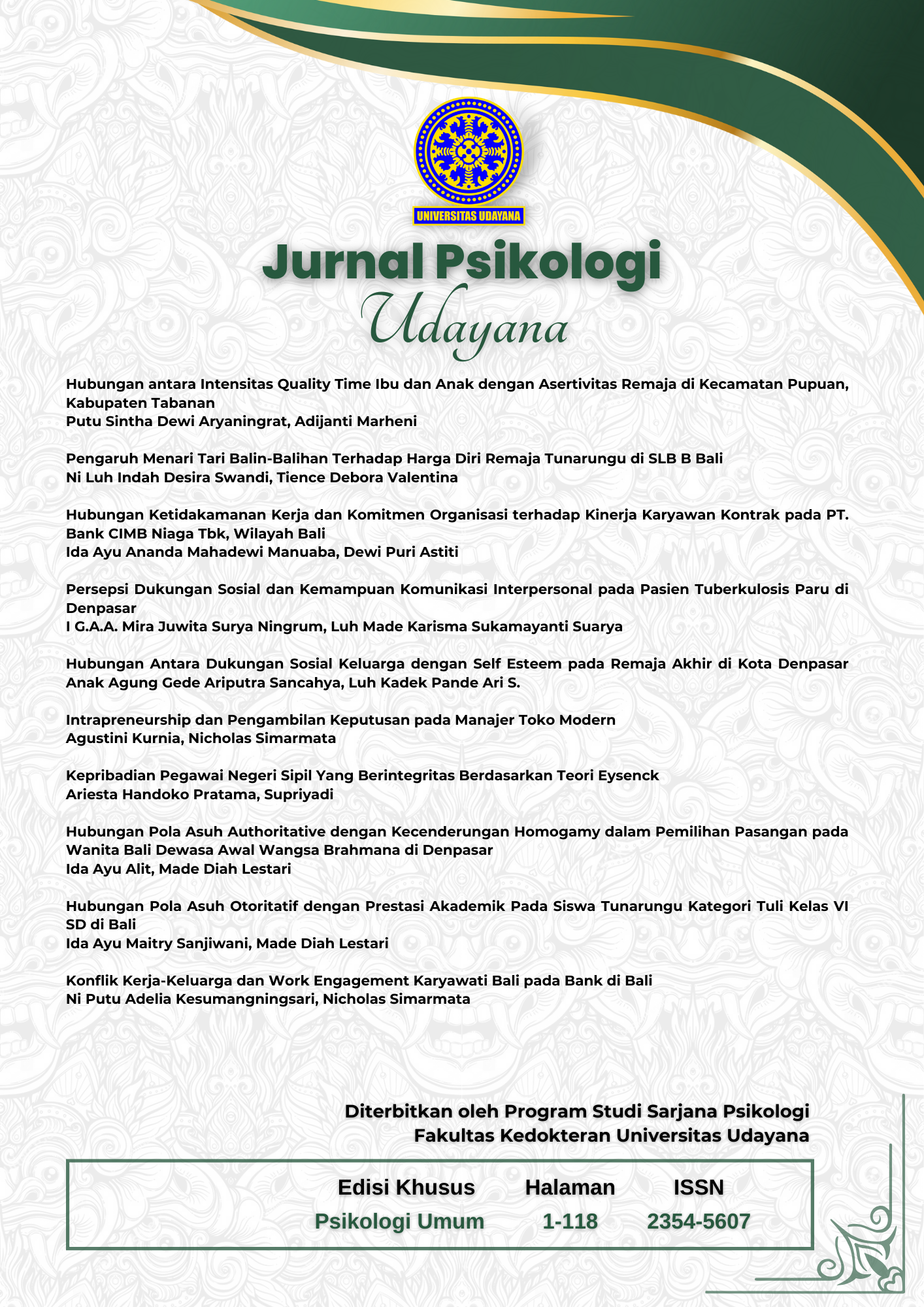HUBUNGAN POLA ASUH OTORITATIF DENGAN PRESTASI AKADEMIK PADA SISWA TUNARUNGU KATEGORI TULI KELAS VI SD DI BALI
Abstract
Currently mass media publish more about psychomotor achievement than academic achievement of students with hearing impairments, while in fact students with hearing impairments have the same intellectual capabilities as normal students. The difference lies in their intellectual development that tends to be sluggish due to limitations in hearing, communicating and using languages. Parenting styles adopted by parents have an important role in developing a child’s intellectual capability so as to achieve high academic achievement. When parents send their children in SLB B or State SLB show that parents applying authoritative parenting style in raising their children.
This study aims to determine the relationship between authoritative parenting styles and the academic achievement of sixth grade elementary school students in Bali with hearing impairments in the deafness category. The subjects used in this study were sixth grade elementary school students with hearing impairments in the deafness category, who are attending SLB B (special school for hearing impaired children) or State SLB and living with their parents. The number of subjects used was as many as 28 students, which are the whole of the population.
The authoritative parenting style scale reliability was 0.940. The result of the normality test on the authoritative parenting style was 0.426. The normality test result on academic achievement was 0.658. The linearity test result on the authoritative parenting style has probability (p) 0.000. The analytical method used was the product moment correlation analysis. The correlation result in this study was 0.836 with probability (p) was 0,000. Based on the results it is seen that there is a positive relationship between authoritative parenting styles and academic achievement of sixth grade elementary school students in Bali with hearing impairments in the deafness category. This means that the stronger authoritative parenting style that are accepted, then there is increase academic achievement of sixth grade elementary school students in Bali with hearing impairments in the deafness category.
Keywords: authoritative parenting styles, academic achievement, students with hearing impairments
Downloads
References
MEDTEK, 4 (2).
Alamdani, B. L. M. (2011). Pertumbuhan dan perkembangan selama masa kehidupan.
(Skripsi tidak dipublikasikan). Fakultas Ilmu Keperawatan, Universitas Indonesia, Jakarta.
Alfiasari. (2011). Hubungan teman sebaya yang berkualitas dan pemanfaatan media
massa meningkatkan kecerdasan sosial atlet muda. Jurnal Ilmu Keluarga dan Konsumen, 5(1), 29-37.
Amalia, S.W. (2004). Hubungan antara kecerdasan emosional dengan prestasi belajar
pada siswa kelas II Smu Lab School Jakarta Timur. (Skripsi tidak dipublikasikan) Universitas Persada Indonesia, Jakarta.
Anak tunarungu unjuk kebolehan. (2012, Juli). Liputan6. Diunduh dari http://news.
liputan6.com/read/423325/anak-tuna-rungu-unjuk-kebolehan tanggal 9 September 2013.
Azwar, S. (2012). Penyusunan skala psikologis. Yogyakarta: Pustaka Pelajar.
Chaplin, J.P. (2005). Kamus lengkap psikologi. Jakarta: Rajawali Pres.
Dalyono, M. (2005). Psikologi pendidikan. Jakarta: Rineka Cipta.
Ghozali, I., & Castellan, J. (2002). Non-parametrik teori dan aplikasi dengan program
SPSS. Semarang: Badan Penerbit Universitas Diponegoro.
Gunarsa, P., & Gunarsa, D. (2012). Psikologi untuk membimbing. Jakarta: Penerbit Libri.
Hallahan, D. P., Kauffman, J. M., & Pullen, P. C. (2009). Exceptional learners an introduction to special education (ed.11). United States of America: Pearson.
Hermanto. (2010). Membangun kesadaran bunyi anak tunarungu melalui pembelajaran
bina persepsi bunyi dan irama di sekolah. Jurnal Majalah Ilmiah Pembelajaran, 2(6), 217-231.
Indrawati. (2008). Hubungan pola asuh otoriter dengan perilaku agresif pada
remaja. (Skripsi tidak dipublikasikan). Fakultas Psikologi, Universitas Gunadarma, Jakarta.
Oktavia, L.F. (2013). Hubungan prestasi akademik, keterampilan psikomotor dan
kematangan emosi mahasiswa profesi ners Unsoed terhadap kemampuan merawat klien gangguan jiwa. (Skripsi tidak dipublikasikan) Fakultas Ilmu Keperawatan, Universitas Jenderal Sudirman, Purwokerto.
Patilima, H. (2005). Metode penelitian kualitatif. Bandung: Alfabeta.
Rola, F. (2006). Konsep diri dan motivasi remaja. (Skripsi tidak dipublikasikan)
Fakultas Psikologi, Universitas Sumatera Utara, Medan.
Rumiani. (2006). Prokrastinasi akademik ditinjau dari motivasi berprestasi dan stress
mahasiswa. Jurnal Psikologi Universitas Diponegoro, 3(2), 35-42.
Sanjaya, A.L. (2011). Dampak perubahan ekonomi terhadap sikap dan perilaku
keluarga TKI dalam kehidupan bermasyarakat di desa gempol sewu kecamatan rowosari kabupaten kendal. Jurnal Nominal, 1(1).
Santoso, S. (2005). Mengatasi berbagai masalah statistik dengan SPSS versi 11.5. Jakarta: PT Elex Media Komputindo Kelompok Gramedia.
Santrock, J.W. (2007). Perkembangan Anak (ed.11.). Jakarta: Erlangga.
Sapthiani, Y. (2011, Oktober). Angkie Yudistia mendengar dengan hati. Kompas. Diunduh dari http://female.kompas.com/read/2011/10/25/19433176/Angkie. Yudistia. Mendengar.dengan.Hati tanggal 9 September 2013.
Sigelman, C.K, & Rider, E.A. (2011). Life span human development. United States of America: Wadsworth.
Slameto. (2003). Belajar dan faktor-faktor yang mempengaruhinya. Jakarta: Rineka Cipta.
Sugiyanto. (2005). Kontribusi gaya belajar dan motivasi berprestasi terhadap prestasi akademik siswa kelas XI SMA Negeri 10 Semarang. Psikologia, 1(1), 38- 47.
Sugiyono. (2009). Metode penelitian bisnis. Bandung: CV. Alfabeta.
Suparno. (2007). Pendidikan anak berkebutuhan khusus. Jakarta: Depdiknas.
Tanpa mendengar, tunarungu pun bisa menari. (2008, Juni). Okezone. Diunduh dari http://news.okezone.com/read/2008/06/19/1/120349/tanpa-mendengar-tuna-rungu-pun-bisa-menari tanggal 9 September 2013.
Wahyuning, W., & Rachmadiana, M. (2003). Mengkomunikasikan moral kepada anak. Jakarta: Elex Media Komputindo.
Yusniah. (2008). Hubungan pola asuh orang tua dengan prestasi belajar siswa Mts Al-Falah Jakarta Timur. (Skripsi tidak dipublikasikan). Universitas Islam Negeri Syarif Hidayatullah Jakarta, Jakarta.
Authors who publish with this journal agree to the following terms:
- Authors retain copyright and grant the journal right of first publication with the work simultaneously licensed under a Creative Commons Attribution-ShareAlike 4.0 International License that allows others to share the work with an acknowledgement of the works authorship and initial publication in this journal.
- Authors are able to enter into separate, additional contractual arrangements for the non-exclusive distribution of the journals published version of the work (e.g., post it to an institutional repository or publish it in a book), with an acknowledgement of its initial publication in this journal.
- Authors are permitted and encouraged to post their work online (e.g., in institutional repositories or on their website) prior to and during the submission process, as it can lead to productive exchanges, as well as earlier and greater citation of published work (See The Effect of Open Access).













